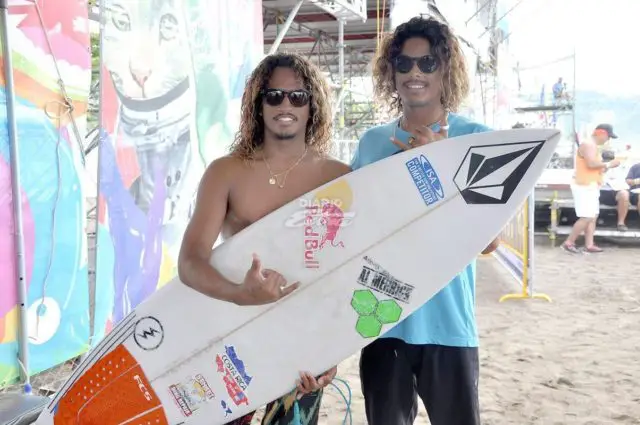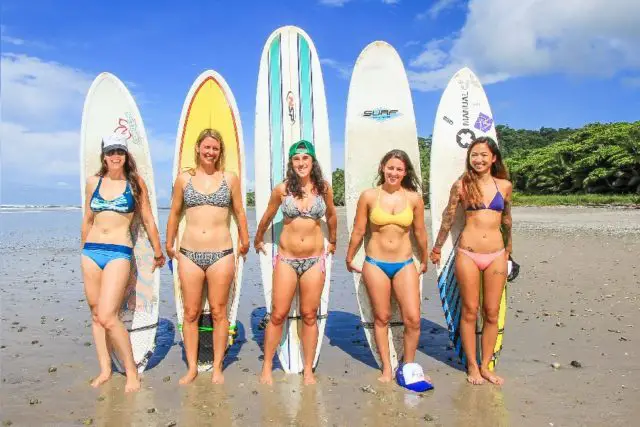Surfing has become one of the most followed sports by Costa Ricans. Athletes such as Carlos Muñoz, Jair Pérez, Brisa Hennesy, and Leilani McGonagle have placed Costa Rica on the cusp of this sport, highly-practiced by both local and foreign tourists.

An initiative to declare the sport as of public interest became effective last week; for its sports, economic and tourist relevance. In addition, it was declared the 3rd Saturday of October as ‘National Surf Day‘. This is accomplished through Law 9337.
With this law, the Surf Federation of Costa Rica expects greater support from public institutions as well as the generation of employment related to sports. For Carlos Brenes, spokesman for the Federation, sport brings tourist and economic appeal to the country, which should be more profitable.
Surfing promotes tourism
According to data provided by the Surf Federation, every year between 400 thousand and 600 thousand tourists are attracted to the country. Each of them, according to the data collected by the Federation, has an expense of up to US$ 120 per day among food, lodging, and transportation.
“Costa Rica is recognized worldwide as a destination for tourists who do not practice surfing but want to do it for the first time. It is the tourism that does kayaking, quad biking or riding a horse. And he returns to Costa Rica to continue doing it”, he explained.
“The mere fact that there are people running waves in the sea, generates a very strong economic activity in Costa Rica”, said Brenes.
From the law, the Minister of Sports, Hernán Solano, said that the promotion of surfing could generate a large tourism industry that benefits local economies economically. He also described this sport as an instrument of prevention, inclusion and social development.
For his part, professional surfer Jair Pérez said that over the years he has seen a significant increase in tourists arriving in the country to practice the sport. Pérez has been surfing since he was 9 in Jacó, Puntarenas, and has put the name of Costa Rica on a high place internationally.
According to data from the Costa Rican Tourism Institute (ICT), 70% of tourists who entered Costa Rica between 2016 and 2018 chose the beaches as the main destination. In addition, 15.2% of tourists who entered by air practiced the sport of surfing on national beaches. From a list of 25 tourist activities carried out by foreign visitors, surfing is in the 11th position.

Employment generation
In addition to the tourist visitation, Brenes assured that they expect the law and the support of the institutions to collaborate in the generation of employment in the coastal areas.
As an example, the communicator said that they will propose to the National Learning Institute (INA) a training program for surf instructors.
“That these programs go from being a responsibility of the Federation, to being a national responsibility. Surfing is a mine, which wants to get everything possible and the country benefits from this”, said Brenes.
The spokesperson acknowledged that one of the biggest challenges is the proliferation of non-professional surf schools on the main beaches of the country.
“The theme of surf schools is so economically powerful that ‘piracy’ or unofficial schools are born. And it is very difficult for them to have control of the municipalities of the beaches”, he explained.
The previous week, the president of the Federation, Randall Chaves, assured that the declaration arrives at the best moment to the national surf; and that they will look for new employment opportunities for coastal areas, with the creation of certified surf instructors and lifeguards.
About this, Brenes said that surfers are lifeguards by “default”, being excellent swimmers and knowing the currents. However, he expressed the need to provide more training on the subject as first aid.
Boost the youngest generation
Brenes said that one of the challenges is the manufacture of new talents, and take advantage of the fact that a “2nd generation” is being reached; that is to say, that the children of the surfers already begin to practice the sport.
Hand in hand with the generation of talent is the goal of creating a high-performance center in the country, which provides adequate facilities for high-performance athletes for their training.
“With a high-performance center we are talking about another level of strengthening the skills of national competitors”, Brenes explained.
Pérez, who has faced the best in the world, agrees with the need to strengthen the promotion of sport among the youngest, in a more formal and professional manner.
“We do not have boys or girls who are training to be athletes, one of my dreams is to train athletes and create people full of values”, said the surfer, who said that sport can become an agent of change for the youngest and, thus, take them away from drug addiction.
Brenes, meanwhile, said that a decade ago surfing told another thing: “10 or 15 years ago it was another story, of addicted and idle surfers. Today, we are -happily- world champions and that shows that we have athletes committed to high performance”, he said.
Institutional support
The declaration of surfing as a sport of national interest goes beyond a mere celebration of the sport.
According to the law passed within the Legislative Assembly, the State may promote the development of necessary infrastructure to ensure that the practice of said sport is safe.
Likewise, the law intends that the Costa Rican Institute of Sport and Recreation (lcoder), municipalities and the Costa Rican Tourism Institute (ICT) empower the country as an ideal place for surfing.
